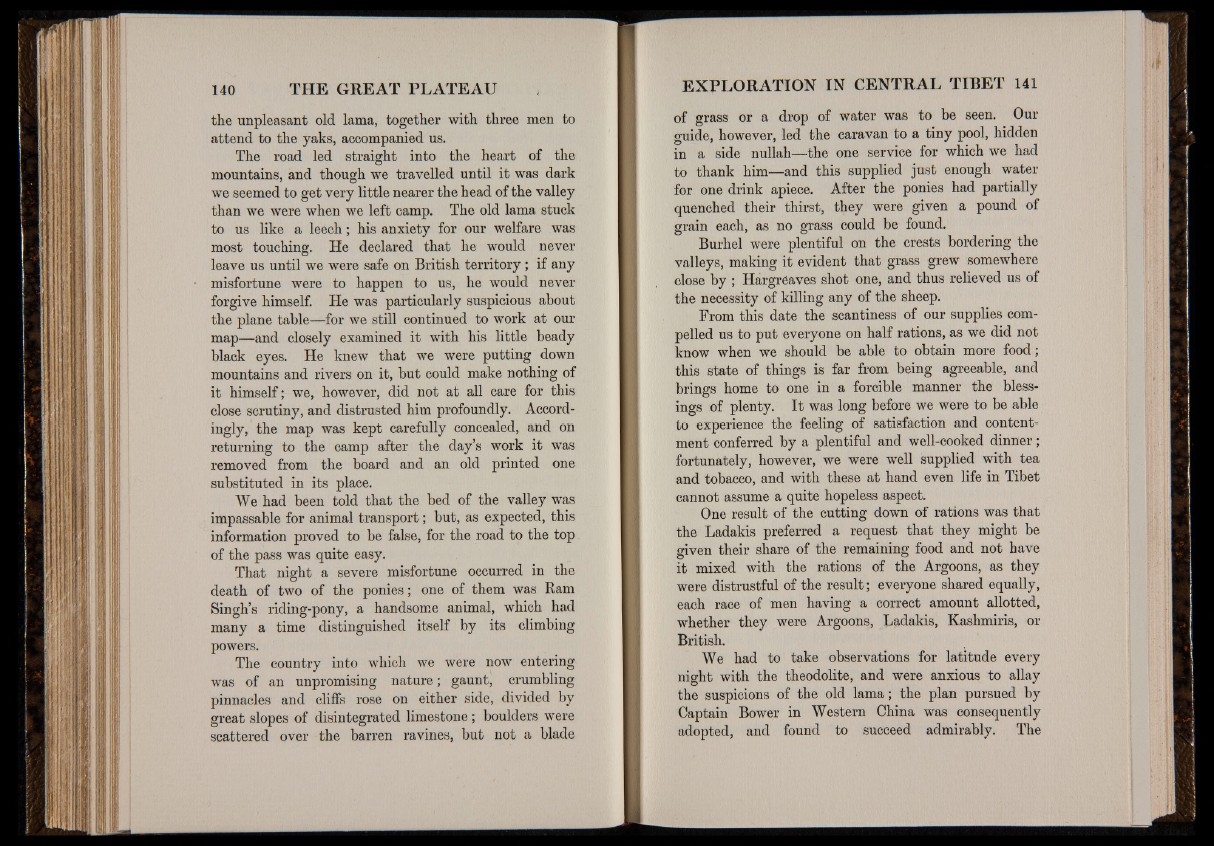
the unpleasant old lama, together with three men to
attend to the yaks, accompanied us.
The road led straight into the heart of the
mountains, and though we travelled until it was dark
we seemed to get very little nearer the head of the valley
than we were when we left camp. The old lama stuck
to us like a leech; his anxiety for our welfare was
most touching. He declared that he would never
leave us until we were safe on British territory ; if any
misfortune were to happen to us, he would never
forgive himself. He was particularly suspicious about
the plane table—for we still continued to work at our
map—and closely examined it with his little beady
black eyes. He knew that we were putting down
mountains and rivers on it, but could make nothing of
it himself; we, however, did not at all care for this
close scrutiny, and distrusted him profoundly. Accordingly,
the map was kept carefully concealed, and on
returning to the camp after the day’s work it was
removed from the board and an old printed one
substituted in its place.
We had been told that the bed of the valley was
impassable for animal transport; but, as expected, this
information proved to be false, for the road to the top
of the pass was quite easy.
That night a severe misfortune occurred in the
death of two of the ponies; one of them was Ram
Singh’s riding-pony, a handsome animal, which had
many a time distinguished itself by its climbing
powers.
The country into which we were now entering
was of an unpromising nature; gaunt, crumbling
pinnacles and cliffs rose on either side, divided by
great slopes of disintegrated limestone; boulders were
scattered over the barren ravines, but not a blade
of grass or a drop of water was to be seen. Our
guide, however, led the caravan to a tiny pool, hidden
in a side nullah—the one service for which we had
to thank him—and this supplied just enough water
for one drink apiece. After the ponies had partially
quenched their thirst, they were given a pound of
grain each, as no grass could be found.
Burhel were plentiful on the crests bordering the
valleys, making it evident that grass grew somewhere
close by ; Hargreaves shot one, and thus relieved us of
the necessity of killing any of the sheep.
From this date the scantiness of our supplies compelled
us to put everyone on half rations, as we did not
know when we should be able to obtain more food;
this state of things is far from being agreeable, and
brings home to one in a forcible manner the blessings
of plenty. I t was long before we were to be able
to experience the feeling of satisfaction and contentment
conferred by a plentiful and well-cooked dinner;
fortunately, however, we were well supplied with tea
and tobacco, and with these at hand even life in Tibet
cannot assume a quite hopeless aspect.
One result of the cutting down of rations was that
the Ladakis preferred a request that they might be
given their share of the remaining food and not have
it mixed with the rations of the Argoons, as they
were distrustful of the result; everyone shared equally,
each race of men having a correct amount allotted,
whether they were Argoons, Ladakis, Kashmiris, or
British.
We had to take observations for latitude every
night with the theodolite, and were anxious to allay
the suspicions of the old lama; the plan pursued by
Captain Bower in Western China was consequently
adopted, and found to succeed admirably. The